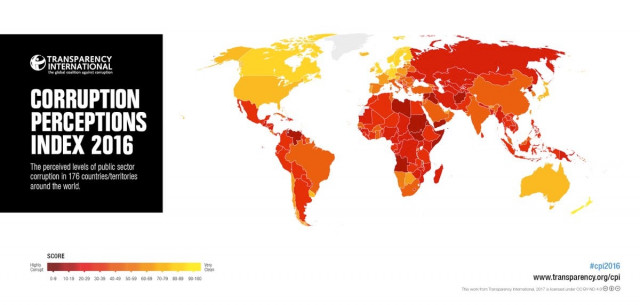Transparency International Index: Pakistan moves down nine places in graft ranking
Fares better than most of its South Asian counterparts

Corruption Perception Index. PHOTO: TRANSPARENCY INTERNATIONAL
The independent organisation, in its Corruption Perceptions Index (CPI) 2016 stated that Pakistan has improved by two points—moving from 30 to 32 out of 100.
Pakistan’s rank in the CPI 2016 improved by nine spots, moving to 61 in the list of most corrupt countries among 176 countries in 2016, from 52 among 168 countries in 2015.
For the first time since 1996 (when the first CPI was published), Pakistan climbed up from the lowest one-third corrupt countries to the middle one-third countries in 2016.
Pakistan fared better than most of its South Asian counterparts, coming in second after China in reducing corruption.
Comparison of data for Asia Pacific Region and neighbouring countries ranks Pakistan (116) higher than Nepal (131), Iran (131), Bangladesh (145), Turkmenistan (154), Uzbekistan (156) and Afghanistan (169).
Each year Transparency International scores countries on how corrupt their public sectors are seen to be, after capturing the informed views of analysts, businesspeople and experts in countries around the world. As many as 13 highly reliable and credible sources have been used by TI to prepare 2016 rankings including assessments of Word Bank, Economists Intelligence Unit among others.
It may be noted that Pakistan has been facing severe issues like terrorism and political instability over the years, however, the present government has considerably stabilised the economy and curbed terrorism.
These measures have increased foreign investment and the pace of infrastructure development. The government has also adopted transparency in award of contracts for development projects thereby increasing investor confidence. National Accountability Bureau (NAB) Chairman Qamar Zaman Chaudhary on Wednesday said the corruption rate in country was declining due to the steps taken by the NAB against corrupt mafia.
Talking to the media during an annual review meeting about performance of the regional office, held at the NAB Punjab office, he said that international agencies also accept decline in corruption in Pakistan in their data.
He said Pakistan has improved its position by nine points in the international ranking in a report presented by the Transparency International regarding the anti-corruption efforts.
The NAB chairman said that the country was running speedily towards the mile-stone of corruption-free country while NAB was focusing on creating awareness among people besides preventive measures and enforcement of laws so that corruption could be nipped in the bud.
He said that now several South Asian Association for Regional Cooperation (Saarc) countries were interested in getting guidance from Pakistan for elimination of corruption.
In a seminar held in Islamabad last year, National Accountability Bureau chairman had proposed the idea of forming a ‘Saarc Anti-Corruption Forum’ which would aim to provide an institutional framework to curb corruption.
He had stressed that the Saarc countries needed to synergise their individual efforts against corruption to achieve the goal of a corruption-free South Asia and change it into a region of development and prosperity. (With additional input from APP)
Published in The Express Tribune, January 26th, 2017.



















COMMENTS
Comments are moderated and generally will be posted if they are on-topic and not abusive.
For more information, please see our Comments FAQ